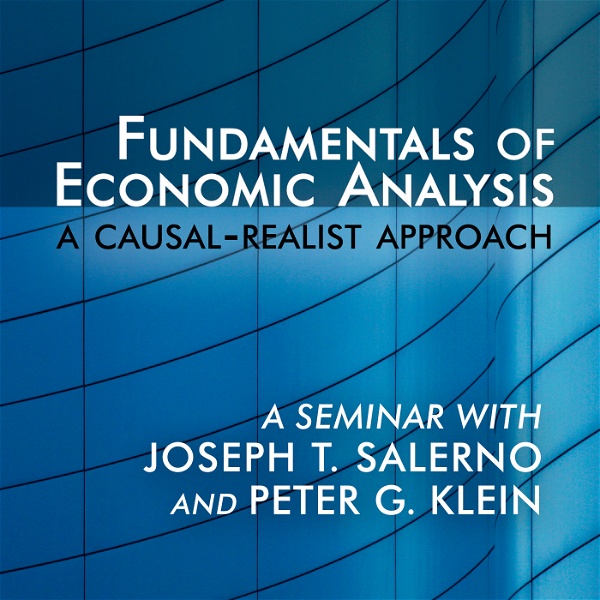
Fundamentals of Economic Analysis: A Causal-Realist Approach
Joseph T. SalernoJoseph T. Salerno and Peter G. Klein are two of the most productive micro-economists in the Austrian School today. This seminar provides an introduction to Austrian Economics. Presented at the Mises Institute, 11-15 June 2007.
| Publishes | Daily | Episodes | 10 | Founded | 15 years ago |
|---|---|---|---|---|---|
| Categories | EducationCourses | ||||
Listen to this Podcast

Latest Episodes
We have today a hybrid of two forms of banking — loan banking (non-inflationary) and deposit banking (inflationary if not 100% reserve holdings). The cause of booms is the credit expansion by central banks that is not backed by pools of private savin... more
Competition can mean rivalry or freedom. All firms must serve the preferences of consumers in order to exist. Monopoly has historically been an artificial privilege granted by the state.
Monopolies do not last for long in free markets unless mainta... more
In the history of money, bartering was awkward because wants were not divisible. Direct exchange depended upon a double coincidence of wants. Demand for a medium of exchange grew until a general medium of exchange emerged, like gold and silver.
A m... more
Causal-realist analysis allows imaginary constructs like the ERE — Evenly Rotating Economy — in order to isolate certain factors like interest. There would be no profit or loss in the ERE, because those can only exist under conditions of uncertainty... more
Time preference says that individuals prefer satisfaction now to later, present to future. This explains the loan market. In the structure of production, the capitalist pays wages now, despite the fact that he himself does not get paid until the fina... more
As with all government intervention, price controls do not achieve what their originators think they will. Trying to maintain a supply of milk by putting a price control on it will cause shortages, which are the very situations the price manipulators... more
Factors of Production are economic goods: scarce means used to achieve an individual’s ends. They are land, labor and capital. Each is examined. Incomes are earned by factor owners as production takes place. There is no separated production and distr... more
What determines market prices? Buyers and sellers must know of feasible trades. They can learn from their mistakes. They prefer higher profits to lower profits. They think in discreet terms. Both participants win in market exchanges.
Prices allocat... more
Key Facts
Reviews
- Best of the Economics Courses on iTunes U
This is the best of the Economics lecture series offered by the Mises Institute, especially for an introduction.
Chart Rankings
How this podcast ranks in the Apple Podcasts, Spotify and YouTube charts.
Apple Podcasts | #233 |
Top Courses Podcasts










Audience Metrics
Listeners, social reach, demographics and more for this podcast.
| Gender Skew | Location | Interests | |||
|---|---|---|---|---|---|
| Professions | Age Range | Household Income | |||
| Social Media Reach | |||||
Frequently Asked Questions About This Podcast
Where can I find podcast stats for this podcast?
Rephonic provides a wide range of podcast stats for this podcast. We scanned the web and collated all of the information that we could find in our comprehensive podcast database. See how many people listen to this podcast and access YouTube viewership numbers, download stats, audience demographics, chart rankings, ratings, reviews and more.
How many listeners does this podcast get?
Rephonic provides a full set of podcast information for three million podcasts, including the number of listeners. View further listenership figures for this podcast, including podcast download numbers and subscriber numbers, so you can make better decisions about which podcasts to sponsor or be a guest on. You will need to upgrade your account to access this premium data.
What are the audience demographics for this podcast?
Rephonic provides comprehensive predictive audience data for this podcast, including gender skew, age, country, political leaning, income, professions, education level, and interests. You can access these listener demographics by upgrading your account.
How many subscribers and views does this podcast have?
To see how many followers or subscribers this podcast has on Spotify and other platforms such as Castbox and Podcast Addict, simply upgrade your account. You'll also find viewership figures for their YouTube channel if they have one.
How many episodes of this podcast are there?
this podcast launched 15 years ago and published 10 episodes to date. You can find more information about this podcast including rankings, audience demographics and engagement in our podcast database.
How do I contact this podcast?
Our systems regularly scour the web to find email addresses and social media links for this podcast. We scanned the web and collated all of the contact information that we could find in our podcast database. But in the unlikely event that you can't find what you're looking for, our concierge service lets you request our research team to source better contacts for you.
Where can I see ratings and reviews for this podcast?
Rephonic pulls ratings and reviews for this podcast from multiple sources, including Spotify, Apple Podcasts, Castbox, and Podcast Addict.
View all the reviews in one place instead of visiting each platform individually and use this information to decide if a show is worth pitching or not.
How do I access podcast episode transcripts for this podcast?
Rephonic provides full transcripts for episodes of this podcast. Search within each transcript for your keywords, whether they be topics, brands or people, and figure out if it's worth pitching as a guest or sponsor. You can even set-up alerts to get notified when your keywords are mentioned.